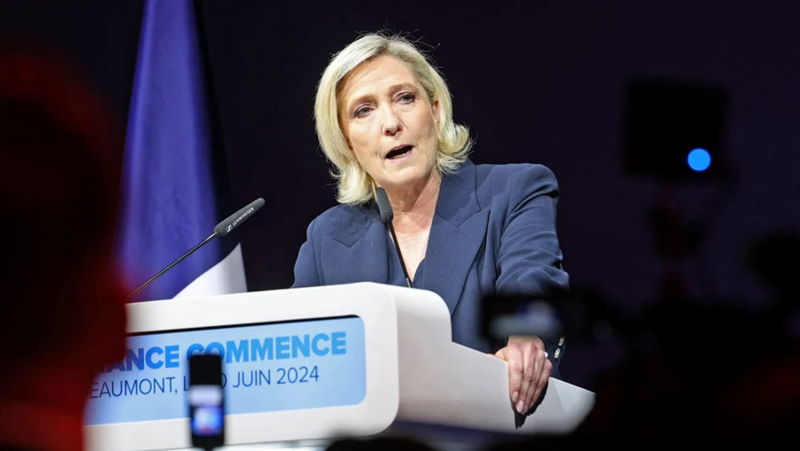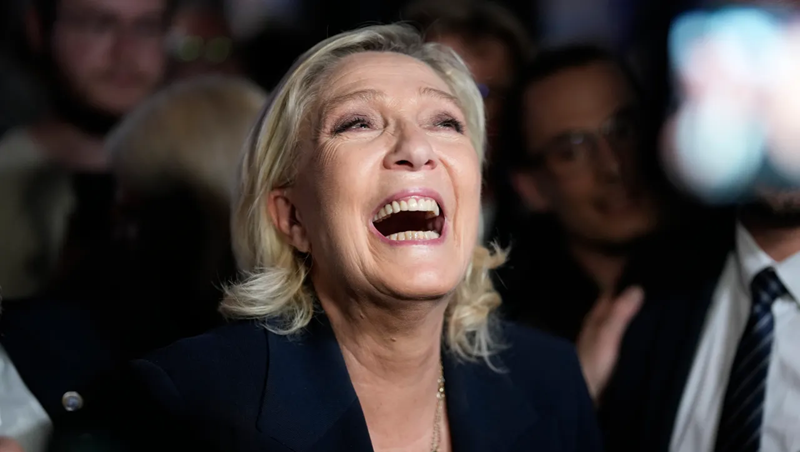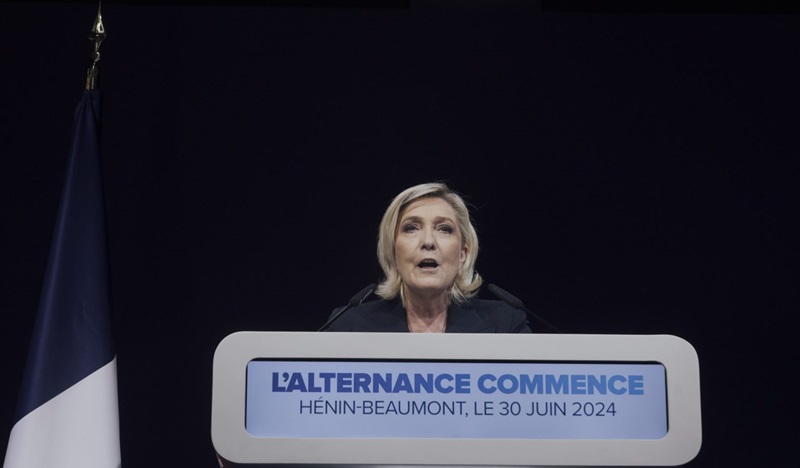In a surprising turn of events, French voters have propelled the far-right National Rally to a strong lead in the first round of the election. This shift in support for the National Rally has raised eyebrows across the country, as the party’s leader, Marine Le Pen, has been a controversial figure known for her nationalist and anti-immigration views.
Despite facing criticism from opponents and the media, Le Pen’s message seems to have resonated with a significant portion of the electorate. The surge in support for the National Rally has sent shockwaves through the political establishment, as the party is now in a prime position to potentially win the election in the second round.
The rise of the far-right in France has sparked concern among many voters, who fear that Le Pen’s policies could have a detrimental impact on the country’s social fabric and international standing. As the election enters its final stages, all eyes will be on the French electorate to see how they ultimately decide the future direction of their country.

Breaking down the French election results: How a national movement gained momentum
The recent French election results have sparked widespread analysis and discussion about how a national movement was able to gain momentum in such a short period of time. Many experts point to the charismatic leadership of the movement’s candidate, who was able to connect with voters on a personal level and inspire a sense of unity and purpose.
Additionally, the movement’s focus on addressing key issues that resonated with the population, such as economic inequality and social justice, helped to mobilize a broad base of support. The movement also utilized social media and other forms of digital communication to spread its message and engage with voters in innovative ways. By effectively leveraging these tools, the movement was able to reach a wide audience and build a strong grassroots network of supporters.
Furthermore, the movement’s emphasis on transparency and accountability in government struck a chord with many disillusioned voters who were looking for a fresh alternative to the status quo. Overall, the success of this national movement in the French election highlights the power of effective leadership, strategic messaging, and grassroots organizing in mobilizing support and effecting change in a democratic society.
Impact on the political landscape: What the leadership of the far-right national movement means for the next rounds of elections in France
The rise of the far-right national movement in France has had a significant impact on the country’s political landscape. With leaders like Marine Le Pen gaining popularity and support, there is a growing concern about the implications this movement may have on the next rounds of elections in France.
The far-right’s strong stance on national identity, immigration, and sovereignty has resonated with a portion of the French population who feel disenfranchised and marginalized by mainstream political parties. This has created a polarizing effect on the electorate, with traditional political parties struggling to maintain their foothold in the face of this growing movement. As a result, the upcoming elections in France may see a shift in power dynamics, with the far-right potentially gaining more influence and representation in government.
This could lead to a more divisive and polarized political climate, as the far-right’s agenda clashes with the values and beliefs of more moderate parties. The leadership of the far-right national movement has already shaken up the traditional political landscape in France, and it remains to be seen how this will play out in the upcoming elections.
Voters will have to carefully consider the implications of supporting a far-right agenda, and the impact it may have on the future of the country’s political system. The next rounds of elections in France are sure to be a crucial turning point for the country, as the influence of the far-right national movement continues to grow.

Voter turnout and demographics: Understanding who supported the far-right movement in France
In recent elections in France, there has been a noticeable rise in voter turnout among certain demographics in support of the far-right movement. This trend has raised questions about the factors that have contributed to this increase in support.
One key factor to consider is the demographics of those who have been drawn to the far-right movement. Research has shown that individuals who are older, male, and less educated are more likely to support far-right parties in France. This demographic profile suggests that those who feel economically marginalized or culturally threatened are more likely to align themselves with far-right ideologies.
Additionally, there is evidence to suggest that individuals living in rural areas are more likely to support far-right parties, as they may feel disconnected from mainstream politics and perceive the far-right as a viable alternative. Furthermore, dissatisfaction with the current political establishment and a desire for change are also believed to be driving factors behind the increased support for the far-right movement.
Overall, understanding the demographics of those who support the far-right in France is crucial for policymakers and politicians to address the underlying issues that are driving this trend and to work towards building a more inclusive and equitable society.

Predictions for the final result: Experts’ opinions on possible scenarios for the French elections
As the French elections approach, experts have been weighing in on the possible scenarios for the final result. While some predict a close race between the leading candidates, others believe that there could be a surprise upset by a lesser-known contender. The current political climate in France has been tumultuous, with a growing dissatisfaction among the electorate towards the establishment parties.
This has led to a rise in support for populist and outsider candidates who promise to bring about change. Some experts believe that this shift in political sentiment could lead to a more fragmented political landscape, with no clear winner emerging from the first round of voting. In this scenario, a runoff between two unexpected candidates could occur, resulting in a final result that defies traditional expectations.
However, others argue that the more established parties will ultimately prevail, with one of the mainstream candidates securing a victory in the end. Overall, the predictions for the final result of the French elections vary widely, reflecting the uncertainty and unpredictability of the current political climate in France.
